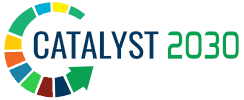Systems Change Learning

Resources categories
Why Systems Change Learning is Important
From the start, Catalyst 2030 members have explored systems change approaches as a way of accelerating our collective efforts to progress the SDGs. Systems change learning refers to the process of continuously furthering our knowledge and processes relating to systems change.
With the rapidly changing state of the world and local circumstances, the application of systems change tools becomes an essential component of collective action. To ensure these remain relevant it is important to promote and enable the continued development, training, assessment and use of systems change tools. We have seen a need for increased engagement in peer learning, particularly from fellow changemakers. Peer-to-peer learning is a useful practice in developing effective systems learning tools.
There is not a singular definition of systems change. Catalyst 2030 defines systems change as confronting root causes of problems, rather than symptoms. It does this by transforming structures, customs, mindsets, power dynamics, policies and rules by strengthening collective power through the active collaboration of diverse people and organisations. To learn more about what systems learning is, visit the About Systems Change page on this site.
Systems Learning Offerings
Recognising the complexity of systems change that requires new mental models, cultures, tools, processes and organising approaches, in order to develop a systems change learning ecosystem within Catalyst 2030, requires the action of social entrepreneurs and the translation of knowledge into theory and practice. Through the work of Catalyst 2030, new collaborations and approaches are being pursued, providing rich opportunities for shared learning and the creation of a collective learning community to inform best practices.
To accomplish this work, the Systems Learning Team partners with the Systems Learning Working Group to achieve the main directions represented in three sub pillars, namely Learning, Community, and Resources and Research. The Systems Learning Series aims to increase knowledge through peer-to-peer learning, including sharing and co-creating tools to achieve systems-level change, and unlocking knowledge theory as a driver of systems change. Lessons learnt and practitioner-developed ways of working are crucial and embedded in all the work of the Systems Learning Team as shown below.
Learning
Facilitate Systems Learning
Catalyst Academy intensive learning certificate programme
Community & Resources
Facilitate Peer-to-Peer Learning
Document and share learnings to amplify the systems change movement
Research
Unlock Knowledge as a Driver of Systems Change
Closing the theory-practice gap involving practitioners
References
- Jackson, A., Montgomery, T., & Kania, J. (2020). Effective Change Requires Proximate Leaders. Stanford Social Innovation Review. https://ssir.org/articles/entry/effective_change_requires_proximate_leaders
- Badgett, A. (2022). Systems Change: Making the Aspirational Actionable. Stanford Social Innovation Review. https://ssir.org/articles/entry/systems_change_making_the_aspirational_actionable
- Savaget, P., Ventresca, M.J., Besharov, M. and Jacobson, J. (2022) Unpacking Systems Change Philanthropy: Five Alternative Models. Skoll Centre Working Paper. Oxford: Skoll Centre for Social Entrepreneurship.
- New Allies: How governments can unlock the potential of social entrepreneurs for the common good. (Led by McKinsey & Company)
